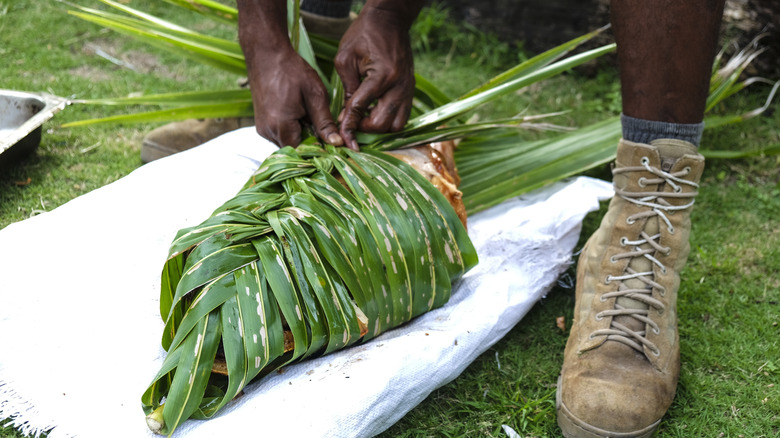Lovo Is The Fijian Barbecue Technique That Yields Astounding Cuisine
The U.S. is known for its many types of regional barbecue, and while folks around the world have heard tell about Texas brisket, most cultures would still probably prefer their own version. Besides the islands themselves, most people know Fiji as the crisp water filtered through the archipelago's many volcanic aquifers, but did you know that Fijians have their own unique style of barbecue?
Lovo is the Fijian method of pit barbecue where meats and vegetables are (just as the name implies) heated over coals and stones in a shallow hole in the ground before being covered with fronds and dirt. Lovo is usually prepared as part of a celebration or ceremony, and even the presentation in prep can be stunning as the meats are braided inside plantain or coconut leaves. Once covered, leaf-wrapped meats and raw veggies are left to cook inside the makeshift furnace for anywhere from three to four hours. The key to quality lovo is even cooking, and covering it guarantees that no heat can escape from the pit.
History of lovo
The origins of lovo are a bit more macabre than its contemporary practice, as, in prehistoric times in Polynesia, Fijian lovo was the way meats were prepared for ritualized cannibalistic victory feasts. In this period, Fijian tribes inhabiting the islands engaged in battle over territory and helped themselves to the enemy once vanquished. European colonists and Christian missionaries often suffered the same fate when they broached the Polynesian islands around the mid-17th century.
While today this no longer occurs, we have happily not lost this unique prep technique pit-cooking method. Today, lovo is enjoyed in most Fijian coastal homes, and is most commonly made with pork or beef. Seafood is occasionally cooked in a lovo, but not too often because it's believed to spoil the delicate nature of fish. Tubers like cassava and yams are a common starchy side to the succulent meats, and often a coconut-based broth is spooned over the pair of them.

